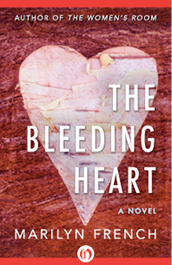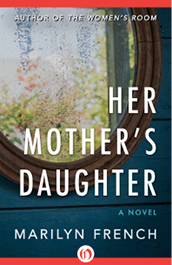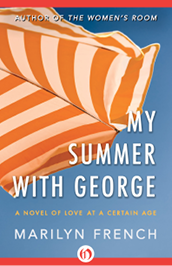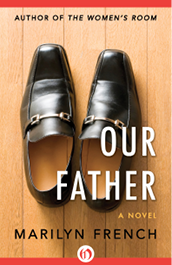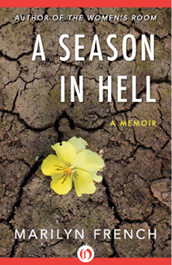Her Mother's Daughter (126 page)

She doesn't know me.
But I know her. While I am gone, she will sit in her rocking chair gazing out at the birds that populate her worldâsparrows and robins, cardinals, blue jays, ducks, geese, swans, gulls. Once in a while she will take out one of the albums I took herâmaybe the one dated 1958âand open the creaky leather cover and stare at a picture encased in plastic.
The first picture is a portrait of a couple, husband and wife, in their fifties. She will study it. She will see the lines on either side of the wife's petulant mouth, and the hard emptiness of the man's eyes. She will know that the wife's blonded beehive hairdo and the man's well-cut suit go with the ornate gilt-framed mirror and the reproduction eighteenth-century console table behind them. She will understand that the prim position of the wife's legs, and the sense of disconnection of the man's head and neck from his extremely substantial body are part of the price paid for the fancy mirror, the table and the oriental vase that rests upon itâjust barely perceptible; for the large pale room reflected in the mirror, and the dogwood tree she knows stands on the front lawn. She understands all this without thinking, without words. She accepts the price as worth what it bought, but sighs as she turns the page.
She'll look away from the next picture, unable to bear it. It is a portrait of her. She is sitting stiffly, legs crossed at the ankle, hair sprayed into waves, a stiff smile lipsticked onto her powdered face. What she sees when she looks at this picture is that there is no gilt-framed mirror, reproduction console table, and no lines on her face. She prefers to look out at the birds.
She understands them too, she knows at least their habits, which, she thinks, is the greatest understanding one can achieve with other animals, even humans, who like to believe that language breaks through silence. But she, locked into silence, believes that language is part of silence, and breaks it only to deceive. Whereas the way a man slurps his coffee, or a woman waves around hands adorned with long bright red fingernails, does not deceive, nor does the flap of a wing on an upward draft. For her, words, smiles, manners, are part of a smoke screen hiding the self from others, hiding the self from the selfânoises hiding the void, chatter hysterically vainly trying to fill the void. Aloneness is all there is. Her hearing aid is turned off.
She picks up the binoculars to watch the birds. She has never read Tennyson, nor heard literature students joke about nature red in tooth and claw. Still, she's seen the neighbor's cat with a bloody bird in its mouth, she's watched the gulls plummet down and pluck a fish from the dappled water. She doesn't much like the gulls, she hates the cat, but she accepts them. She has always believed that life is a matter of economics. Therefore her own depression, when now she has everything she ever wanted, puzzles her.
But she doesn't linger over it. Why should she not be depressed, sick and dying as she is? She prefers to watch the mother duck who promenades at a dignified pace across the lawn every day, followed by her twelve little ones. Sometimes momma-duck (as my mother calls her) has to extricate one of those little ones from the wire mesh fence around the next-door property. Then she grows exercised, her feathers flap, her head pokes, jabs. And always at those times, the father duckâmy mother is sure he is the father duckâsquawks loudly from the lake, demanding her presence, jealous of her attention to the young ones. Maybe she confuses him with her husband, my father, whose sighs seem as loud as a squawk even to her deaf ears when she wants to sit up with her daughter and have one more cigarette, one more drink.
My father does not like the geese, who shit on his lawn. But she likes the geese. They cluster in the water just behind her house and squawk to her, asking her to feed them. She saves up bread and suet. And on nice days, she asks Ed to help her, and he holds her arm and they walk out to the water, Ed carrying the plastic bag of food. She reaches in and grabs a bit and hurls it. She hates the pushy geese who manage to get to the front. She is sure they are all male. She pities the smaller geese in back, hovering, afraid to venture forward. She is sure they are females. She hurls the bread or suet to them, throwing as hard as she can. But her arm is weak, her throw unpracticed, and most times, the forward birds catch the prizes. Disgusted, she turns on her heel and returns to the house, alone now, anger makes her strong enough to walk unassisted. That life is an economic matter does not make its budgets pleasant. She does not begrudge the robins and sparrows their worms, but she grieved over a dead monarch in her broccoli patch.
“Throw it far out! To the little ones!” she orders Ed.
She puts down the binoculars, they are too heavy to hold for long. She returns to the album in her lap, turning the pages without really looking at the pictures. She comes upon a photograph of a suburban ranch house somewhat like the one she lives in. It is a large house with neatly trimmed shrubs and lawn. It looks deserted: the shades are neatly pulled halfway down, but there is nothing in the picture except a shiny 1958 Buick parked in the driveway. She does not understand why I took that picture, why it is in the album.
But the next picture makes her exclaim aloud. It is the street in Williamsburg where she lived as a child. It is as poor and chaotic in 1958 as it was in 1914, but there is little that is familiar in it. Still, she recognizes it. Her stomach flutters. She studies the picture for a long time. Then she closes the album.
She sits back in the rocker and half-closes her eyes. She is tired. She should not sleep, she has already had a two-hour nap. She yawns. She reaches over to the little table beside her and lights the half-cigarette she cut in the morning, after breakfast. She inhales deeply, satisfied for the first time in hours. She looks out at the lake. She does not think about Williamsburg, about the past, about her life. She does not think about her husband, her children, her grandchildren, about the present. She does not think about the future, believing she does not have one. She does not let herself down into the well of black rage that lies beneath the soft folds of her face. She does not think: my mother never combed my hair.
It is I who will be thinking that, I, five thousand miles away lying under the stars that glitter through the palm fronds, smelling camel dung and desert flowers and thinking of her.
No: she thinks of Anastasia. She sees her at a great reception, meeting the shah, passing rows of men in elaborate uniform, gold braid and ribbons, boiled shirts and black suits with rosettes in their lapels, Anastasia in a flowing gown, her hair long and fair floating behind her, her body young and lithe as she strides past them. She is beautiful, as beautiful as a princess with her slender legs and hands, her shining hair, and she passes through these throngs of kings with grace and disdain. Her bearing, her slight smile, announce that she is unattainable: utterly desirable but full of scorn, independent, self-sufficient. She approaches the throne but does not kneel. The shah confers upon her the award of Greatest Photographer in the World. Belle's heart is full of pride.
When I return, she may ask me about this reception. She will not understand when I look at her bewildered. She will not understand when I say the shah is gone, dead, and that I am fifty, greying, plump, tired, back from an assignment to photograph women. She will not believe me. After all, she saw it. When she is a hundred and ten she will sketch for her great-grandchildren the picture of Anastasia in a flowing white gown, curling her lip at the heads of state of fifty nations.
The vision passes. She forgets it. It goes to join all the other visions of this sort she has had of the Anastasia she knows. Her cigarette half is down to stub. She tamps it out. She sits. She thinks she should do something, but she is too tired, and besides, what is there to do? She gazes at the grass, the birds, the water with its puddles of light. She rocks a little. There is a draft somewhere, she can feel it on her neck. Where is Eddy? He must do something about this draft.
She crosses her hands precisely in her lap and smiles a stiff smile, a social smile, although she is alone. She cannot be patronizing the birds, she knows they do not see her. Maybe she is patronizing her reflection in the window. She offers herself an arranged smile. The image, she thinks, is not without dignity.
When I left her last, yesterday, I held her for a long time, I kissed her temple. She looked at me. She said: “I will never forget how sweet you were to me.”
It is the most she has ever given me. It is the most I can expect. It has to be enough.
Marilyn French was a novelist and feminist. Her books include
The Women's Room
, which has been translated into twenty languages;
From Eve to Dawn, a History of Women in the World
;
A Season in Hell
;
Her Mother's Daughter
;
Our Father
;
My Summer with George
; and
The Bleeding Heart
. She died in 2009.
All rights reserved, including without limitation the right to reproduce this ebook or any portion thereof in any form or by any means, whether electronic or mechanical, now known or hereinafter invented, without the express written permission of the publisher.
This is a work of fiction. Names, characters, places, events, and incidents either are the product of the author's imagination or are used fictitiously. Any resemblance to actual persons, living or dead, businesses, companies, events, or locales is entirely coincidental.
Copyright © 1987 by Belles-Lettres, Inc.
Cover design by Tracey Dunham
978-1-4804-4490-4
This edition published in 2013 by Open Road Integrated Media, Inc.
345 Hudson Street
New York, NY 10014

